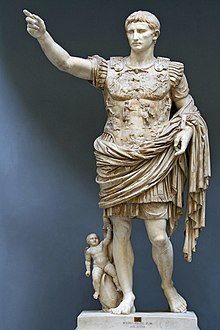27 BC
Appearance
This article needs additional citations for verification. (February 2024) |
| Millennium: | 1st millennium BC |
|---|---|
| Centuries: | |
| Decades: | |
| Years: |
| 27 BC by topic |
| Politics |
|---|
| Categories |
| Gregorian calendar | 27 BC XXVII BC |
| Ab urbe condita | 727 |
| Ancient Greek era | 188th Olympiad, year 2 |
| Assyrian calendar | 4724 |
| Balinese saka calendar | N/A |
| Bengali calendar | −619 |
| Berber calendar | 924 |
| Buddhist calendar | 518 |
| Burmese calendar | −664 |
| Byzantine calendar | 5482–5483 |
| Chinese calendar | 癸巳年 (Water Snake) 2671 or 2464 — to — 甲午年 (Wood Horse) 2672 or 2465 |
| Coptic calendar | −310 – −309 |
| Discordian calendar | 1140 |
| Ethiopian calendar | −34 – −33 |
| Hebrew calendar | 3734–3735 |
| Hindu calendars | |
| - Vikram Samvat | 30–31 |
| - Shaka Samvat | N/A |
| - Kali Yuga | 3074–3075 |
| Holocene calendar | 9974 |
| Iranian calendar | 648 BP – 647 BP |
| Islamic calendar | 668 BH – 667 BH |
| Javanese calendar | N/A |
| Julian calendar | 27 BC XXVII BC |
| Korean calendar | 2307 |
| Minguo calendar | 1938 before ROC 民前1938年 |
| Nanakshahi calendar | −1494 |
| Seleucid era | 285/286 AG |
| Thai solar calendar | 516–517 |
| Tibetan calendar | 阴水蛇年 (female Water-Snake) 100 or −281 or −1053 — to — 阳木马年 (male Wood-Horse) 101 or −280 or −1052 |

Year 27 BC was either a common year starting on Sunday, Monday or Tuesday or a leap year starting on Monday of the Julian calendar (the sources differ, see leap year error for further information) and a common year starting on Sunday of the Proleptic Julian calendar. At the time, it was known as the Year of the Second Consulship of Octavian and Agrippa (or, less frequently, year 727 Ab urbe condita). The denomination 27 BC for this year has been used since the early medieval period, when the Anno Domini calendar era became the prevalent method in Europe for naming years.
Events
[edit]By place
[edit]Roman Republic/Empire
[edit]- Gaius Julius Caesar Octavian becomes Roman Consul for the seventh time. His partner Marcus Vipsanius Agrippa becomes Consul for the third time.
- January 16 – Octavian formally returns full power to the Senate; they give him the titles of Princeps and Augustus. He accepts this honor, having declined the alternative title of Romulus,[1] thus becoming first Roman emperor.
- Caesar Augustus starts a new military reform. He reduces the number of legions to 26 and creates the Praetorian Guard (1,000 men).
- Augustus forms the Classis Misenensis, based in the harbor of Portus Julius at Misenum.
- Agrippa divides Hispania Ulterior into Baetica and Lusitania, and enlarges Hispania Citerior.
- Northern statue of the Colossi of Memnon is shattered by an earthquake in Egypt (according to Strabo).
- Marcus Agrippa begins the construction of the old Pantheon, Rome.
- Augustus' first census of the Roman Empire (formerly the Roman Republic) reports a total of 4,063,000 citizens.[2]
Births
[edit]- Ai of Han, Chinese emperor of the Han Dynasty (d. 1 BC)
Deaths
[edit]- Marcus Terentius Varro, Roman scholar and writer (b. 116 BC)[3]
References
[edit]Wikimedia Commons has media related to 27 BC.
- ^ Gross, W. H. "The Propaganda of an Unpopular Ideology", in The Age of Augustus: Interdisciplinary Conference held at Brown University, April 30–May 2, 1982, edited by Rolf Winkes (Rhode Island: Centre for Old World Archaeology and Art, 1985), 35.
- ^ "LacusCurtius • Res Gestae Divi Augusti (II)". penelope.uchicago.edu. Retrieved February 22, 2017.
- ^ "Marcus Terentius Varro". Encyclopaedia Britannica. Retrieved February 22, 2024.
